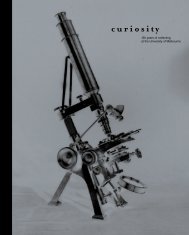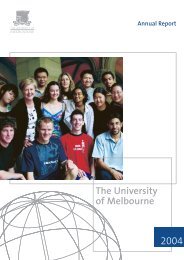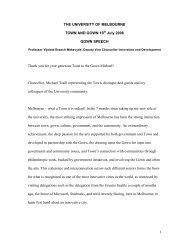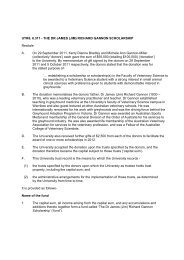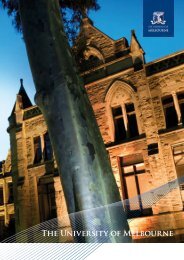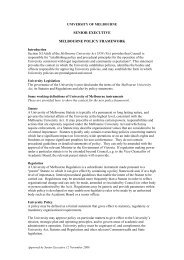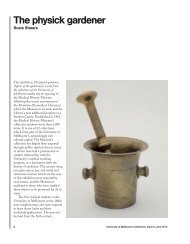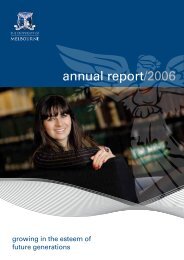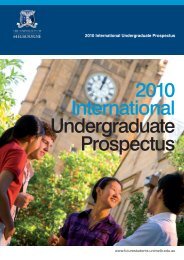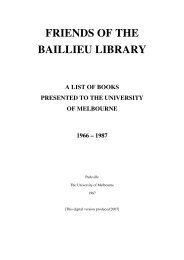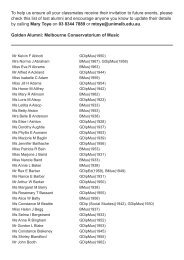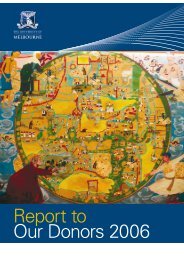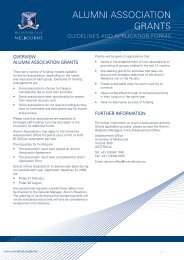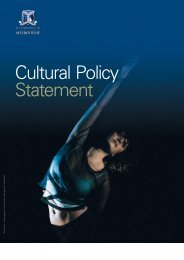2007 Annual report (PDF 8.1 Mb) - University of Melbourne
2007 Annual report (PDF 8.1 Mb) - University of Melbourne
2007 Annual report (PDF 8.1 Mb) - University of Melbourne
You also want an ePaper? Increase the reach of your titles
YUMPU automatically turns print PDFs into web optimized ePapers that Google loves.
BINDING THE<br />
stRANDS TOGETHER<br />
$18 million on a number <strong>of</strong> new initiatives<br />
to promote the <strong>Melbourne</strong> Model. These<br />
include:<br />
> construction <strong>of</strong> new student centres<br />
- $3.8 million<br />
> change management $1.1 million<br />
> curriculum design $3.0 million<br />
> marketing $7.3 million<br />
Growing Esteem Transition Funds provided<br />
a significant aid in assisting the <strong>University</strong><br />
and its divisions in meeting the challenge<br />
<strong>of</strong> the Growing Esteem Strategy. A further<br />
$30 million fund for Strategic Research has<br />
been announced from 2008.<br />
The 2009 budget will see further reform,<br />
in response to the KPMG Review <strong>of</strong><br />
Strategic Business Processes and other<br />
developments internal and external to the<br />
<strong>University</strong>.<br />
<strong>University</strong> Administration<br />
<strong>2007</strong> was a year <strong>of</strong> significant transition<br />
in the <strong>University</strong>’s administrative<br />
arrangements. With the support <strong>of</strong> federal<br />
funding from the Workplace Productivity<br />
Fund, a major project was undertaken<br />
to revolutionise both undergraduate and<br />
postgraduate education through the<br />
creation <strong>of</strong> a student-centric administration.<br />
Increase efficiency <strong>of</strong><br />
<strong>University</strong> administration<br />
through academic<br />
and IT shared services<br />
implementation<br />
Student Focussed<br />
Administration<br />
Strategic Priorities<br />
> Make necessary changes to academic<br />
administration, including process mapping<br />
and reform and the implementation <strong>of</strong><br />
new service delivery model<br />
> Implement the Critical Path Plan<br />
developed by MM08 in conjunction with<br />
Boston Consulting in late 2006<br />
Achievements<br />
Towards the end <strong>of</strong> 2006, the Boston<br />
Consulting Group (BCG) worked with the<br />
<strong>University</strong> to develop a Critical Path Plan for<br />
implementing the <strong>Melbourne</strong> Model, which<br />
covered the milestones and timelines<br />
required in order for the <strong>University</strong> to be<br />
ready to introduce a new curriculum and<br />
student support services in 2008. BCG<br />
returned in <strong>2007</strong> to work intensively with<br />
<strong>University</strong> staff to develop a new system<br />
for delivery <strong>of</strong> student services.<br />
All student support services were<br />
reviewed in <strong>2007</strong> with the overarching<br />
aim <strong>of</strong> producing a student-centric model<br />
improving students’ <strong>Melbourne</strong> Experience<br />
through the availibility <strong>of</strong> co-ordinated,<br />
flexible, equitable and accessible. The<br />
resulting <strong>Melbourne</strong> Student Services<br />
Model (MSSM) radically changes the<br />
manner in which student support services,<br />
are delivered.<br />
The new model recommends that<br />
students access services either online or<br />
through one-stop shop student centres<br />
in faculties and graduate schools. The<br />
New Generation undergraduate degree<br />
structure requires student advisors to have<br />
a broad understanding <strong>of</strong> all undergraduate<br />
programs in the <strong>University</strong>. Each centre<br />
will also provide enrichment services such<br />
as language support and careers advice<br />
tailored by discipline and degree type<br />
(undergraduate or research higher degree).<br />
Centres are supported by strong systems<br />
and centres policy. Accountabilities, budgets<br />
and incentives have been aligned to produce<br />
an efficient and adaptable model.<br />
By the start <strong>of</strong> the 2008 academic year,<br />
interim student centres will have been<br />
created in existing faculty <strong>of</strong>fice spaces<br />
for the New Generation undergraduate<br />
degrees and for the faculties which are to<br />
become graduate schools.<br />
Plans are also progressing to create<br />
permanent student centres focussing,<br />
particularly in the first instance, on the<br />
Eastern Precinct for Science (for details<br />
refer to page 41) and the Brownless for<br />
Medicine, Dentistry and Health Science.<br />
Most faculties have created new staffing<br />
arrangements to service their student<br />
centre, and a student advisor training<br />
program has been rolled out to provide staff<br />
with the skills and information to undertake<br />
new roles.<br />
Coordination <strong>of</strong> academic and student<br />
support rested with a newly created<br />
organisational unit, the Office <strong>of</strong> the<br />
Provost, with staff members responsible<br />
for delivery <strong>of</strong> student services <strong>report</strong>ing<br />
to that Office. Organisationally, student<br />
centres remain within faculties/graduate<br />
schools, with overall responsibility for<br />
performance standards and coordination<br />
resting with the Office <strong>of</strong> the Provost.<br />
Re-conceptualisation <strong>of</strong> policies and<br />
the organisation and location <strong>of</strong> work<br />
was overseen by the <strong>Melbourne</strong> Model<br />
Implementation Taskforce, and involved<br />
a large number <strong>of</strong> staff from across the<br />
<strong>University</strong> in subsidiary working groups.<br />
This group also developed processes<br />
for managing change and monitored<br />
implementation. Staff morale was regularly<br />
monitored through the process, and overall<br />
the commitment to the outcomes <strong>of</strong> the<br />
PROFILE<br />
Dr Rachel Caruso<br />
Dr Rachel Caruso, <strong>University</strong> <strong>of</strong><br />
<strong>Melbourne</strong> materials chemist and ARC<br />
Australian Research Fellow, has won<br />
a <strong>2007</strong> Cosmos Bright Sparks Award,<br />
placing her among Australia’s top<br />
10 scientists under 40 as judged by<br />
Cosmos science magazine.<br />
Dr Caruso specialises in developing<br />
new techniques to fabricate<br />
nanomaterials. These can be used<br />
for a startling array <strong>of</strong> applications,<br />
from manufacturing solar panels<br />
to building substances that help<br />
degrade contaminants found in<br />
industrial wastewater. Her ultimate<br />
goal is to help minimise human<br />
impacts on the environment.<br />
Dr Caruso is currently engaged in<br />
research investigating the potential<br />
<strong>of</strong> gold nanoparticles to enhance the<br />
efficiency <strong>of</strong> existing water purification<br />
techniques based on the sponge-like<br />
features <strong>of</strong> titanium dioxide materials.<br />
Titanium dioxide materials that have<br />
applications in producing electricity<br />
from sunlight are also being fabricated.<br />
As a recipient <strong>of</strong> the Victorian Young<br />
Tall Poppy Science Award in 2006 Dr<br />
Caruso has presented her research and<br />
discussed her scientific career with<br />
high school students throughout <strong>2007</strong>.<br />
The <strong>University</strong> <strong>of</strong> <strong>Melbourne</strong> <strong>Annual</strong> Report <strong>2007</strong> 67



